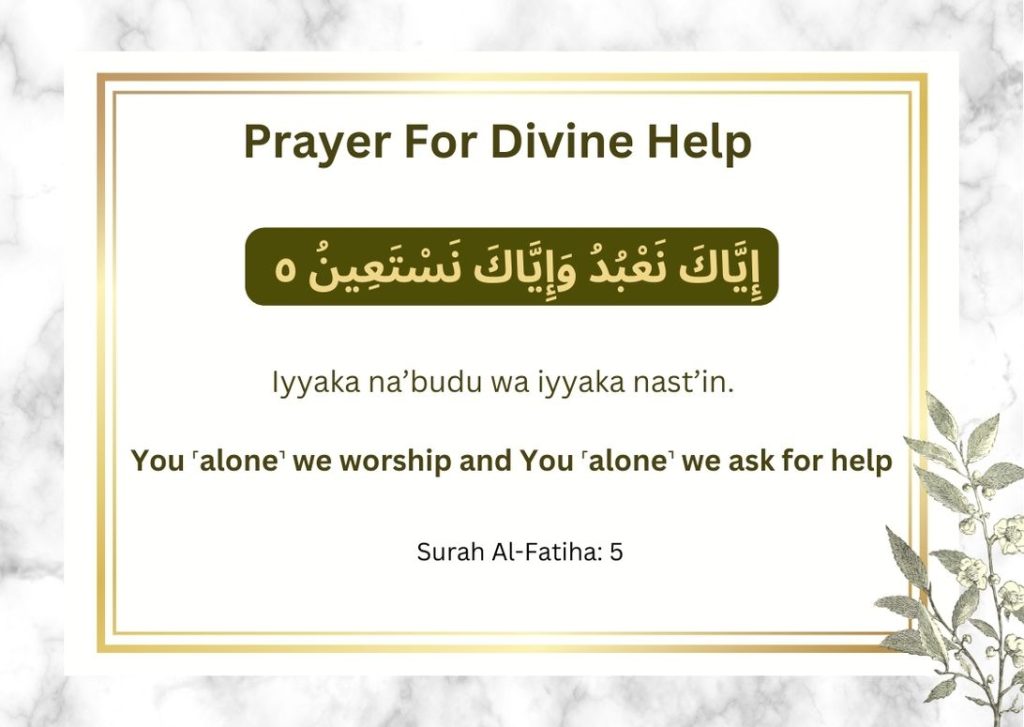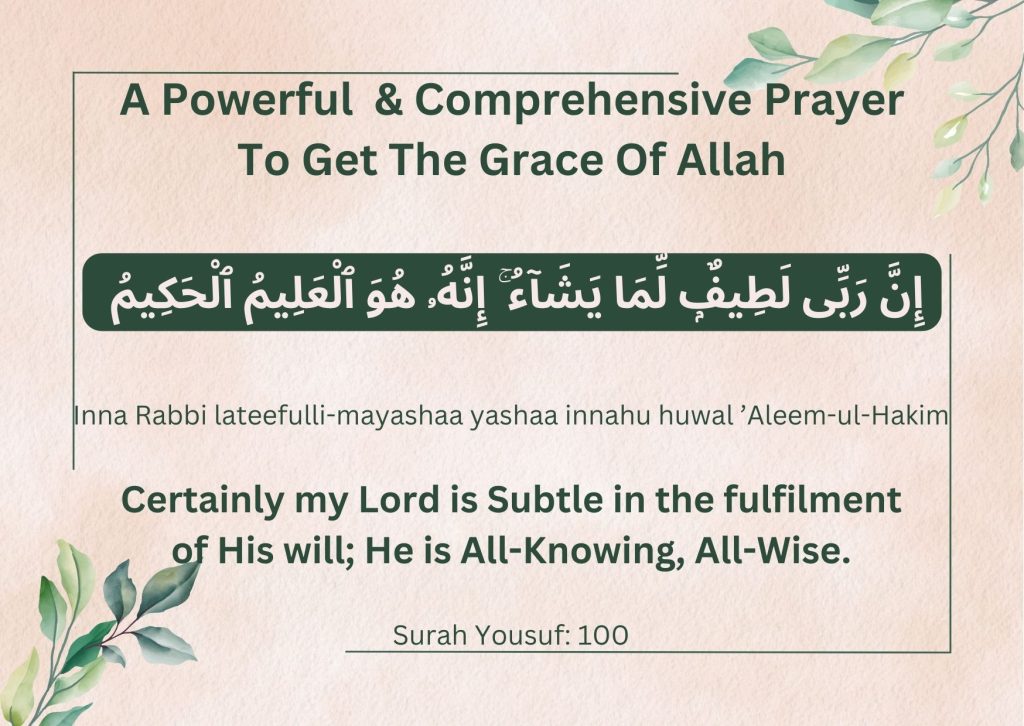
Introduction of prayer:
This is the first prayer mentioned in the first Surah of Qur’an, Al-Fatiha. This Surah comprises of seven verses. The first three verses are about praise of Allah Kareem and His Attributes. The last three verses consist of prayer of man towards His lord which Allah himself has, in His infinite mercy, taught him. The Holy Prophet (pbuh) said about Surah Al-Faitiha;
” قَالَ اللَّهُ تَعَالَى قَسَمْتُ الصَّلاَةَ بَيْنِي وَبَيْنَ عَبْدِي نِصْفَيْنِ وَلِعَبْدِي مَا سَأَلَ فَإِذَا قَالَ الْعَبْدُ { الْحَمْدُ لِلَّهِ رَبِّ الْعَالَمِينَ} . قَالَ اللَّهُ تَعَالَى حَمِدَنِي عَبْدِي وَإِذَا قَالَ { الرَّحْمَنِ الرَّحِيمِ} . قَالَ اللَّهُ تَعَالَى أَثْنَى عَلَىَّ عَبْدِي . وَإِذَا قَالَ { مَالِكِ يَوْمِ الدِّينِ} . قَالَ مَجَّدَنِي عَبْدِي – وَقَالَ مَرَّةً فَوَّضَ إِلَىَّ عَبْدِي – فَإِذَا قَالَ { إِيَّاكَ نَعْبُدُ وَإِيَّاكَ نَسْتَعِينُ} . قَالَ هَذَا بَيْنِي وَبَيْنَ عَبْدِي وَلِعَبْدِي مَا سَأَلَ . فَإِذَا قَالَ { اهْدِنَا الصِّرَاطَ الْمُسْتَقِيمَ * صِرَاطَ الَّذِينَ أَنْعَمْتَ عَلَيْهِمْ غَيْرِ الْمَغْضُوبِ عَلَيْهِمْ وَلاَ الضَّالِّينَ} . قَالَ هَذَا لِعَبْدِي وَلِعَبْدِي مَا سَأَلَ ”
Abu Huraira reported:
The Messenger of Allah (ﷺ) declare that Allah the Exalted had said: I have divided the prayer into two halves between Me and My servant, and My servant will receive what he asks. When the servant says: Praise be to Allah, the Lord of the universe, Allah the Most High says: My servant has praised Me. And when he (the servant) says: The Most Compassionate, the Merciful, Allah the Most High says: My servant has lauded Me. And when he (the servant) says: Master of the Day of judg- ment, He remarks: My servant has glorified Me. and sometimes He would say: My servant entrusted (his affairs) to Me. And when he (the worshipper) says: Thee do we worship and of Thee do we ask help, He (Allah) says: This is between Me and My servant, and My servant will receive what he asks for. Then, when he (the worshipper) says: Guide us to the straight path, the path of those to whom Thou hast been Gracious not of those who have incurred Thy displeasure, nor of those who have gone astray, He (Allah) says: This is for My servant, and My servant will receive what he asks for. (Sahih Muslim: 395a)
Explanation & virtues of prayer:
This verse contains two concepts of Islam: Tawhid Al ‘Ulhiyyah and Tawhid Ar Rububiyyah, the Oneness of Allah Kareem in worship and Oneness of Allah Kareem in Lordship.
1- إِيَّاكَ نَعْبُدُ (You ˹alone˺ we worship):
Tawhid Al-Ulihiyyah; (Oneness of Allah in worship);
Some of the Islamic scholars say, Al-Fatihah is the secret of the Qur’an, while these words are the secret of Al-Fatihah,
إِيَّاكَ نَعْبُدُ وَإِيَّاكَ نَسْتَعِينُ
(You we worship, and You we ask for help from.) (m’arif ul Qur’an)
The word Ibadah originated from “abd” which means servant or slave. So being “Abdullah” (servant of Allah) or putting oneself in His servitude demands following His commands in all matters without any questioning and by sacrificing his wishes for the sake of His Will.
Acts of worship (Ibadah) are not limited merely to prescribed prayers or fasting. Imam Al-Ghazzali in his book Arba’in has enumerated ten forms which worship can take:-
1. Prayers.
2. Prescribed Alms-giving.
3. Fasting.
4. Hajj or pilgrimage to Makkah.
5. Reciting the Holy Qur’an.
6. Remembrance of Allah in all possible situations.
7. Earning one’s livelihood in accordance with the regulations of the Shariah.
8. Fulfilling one’s obligations towards one’s companions and neighbors.
9. Persuading people to act righteously and dissuading them from what is reprehensible and forbidden.
10. To follow the Sunnah, or the practice of the Holy Prophet (peace be upon him)
Allah Kareem proclaimed in Surah Adh-Dhariyat; verse: 56, that He Almighty has created the mankind and Jinn for His worship only;
وَمَا خَلَقْتُ ٱلْجِنَّ وَٱلْإِنسَ إِلَّا لِيَعْبُدُونِ ٥٦
I did not create jinn and humans except to worship Me.
The five pillars of Islam are the basic course of Islamic worship which train one’s inner self and show him the way to
organization discipline, moderation and balance and produces the concept to fight in a better way against all odds
of materialistic world. The Islamic concept of worship liberates whole humanity, from colour, creed, prejudice,
economic genocide, terrorism, bloodshed. If the system of Islamic concept of worship is practiced whole heartedly with good intentions, then there can be an exemplary and continuous revolution in human society, without any war and fight.
2- وَإِيَّاكَ نَسْتَعِينُ (and You ˹alone˺ we ask for help):
Tawhid Ar-Rubibiyyah; (Oneness of Allah in Lordship)
ISTI’ANAH استعانة means; “Seeking aid.” Imploring help from God. This is the ultimate result of the previous concept of Tawhid al Uluhiyyah (Oneness in worship).
إِيَّاكَ نَعْبُدُ وَإِيَّاكَ نَسْتَعِينُ
(You we worship, and You we ask for help from) “Contains Allah’s command to us to perform sincere worship for Him and to seek His aid concerning all of our affairs.”
It may also be noticed that the phrase: اِيَّاكَ نَسْتَعِيْنُ (to You alone we pray for help) does not mention the purpose for which help is being sought. According to most of the commentators, it generalises the idea of the request to cover everything from acts of worship to all possible worldly or other-worldly concerns. (M’arif ul Qur’an)
When a Muslim shows his faith in Allah, he should never love, fear or depend on anyone else except Allah, nor he should affiliate desires and hopes other than Allah almighty. He should never call upon or supplicate except Allah. He should show his complete submission, self humbleness and total humility only to Allah Kareem. This verse requires a believer to put complete reliance in all matters in Allah Kareem, as only Allah has the power and control on all affairs. Allah Kareem says in Surah Hud, verse: 123;
فَٱعْبُدْهُ وَتَوَكَّلْ عَلَيْهِ ۚ وَمَا رَبُّكَ بِغَـٰفِلٍ عَمَّا تَعْمَلُونَ
So worship Him and put your trust in Him. And your Lord is never unaware of what you do.
In an other Ayah Allah Kareem commands His Messenger to say;
قُلْ هُوَ ٱلرَّحْمَـٰنُ ءَامَنَّا بِهِۦ وَعَلَيْهِ تَوَكَّلْنَا ۖ
Say, “He is the Most Compassionate—in Him ˹alone˺ we believe, and in Him ˹alone˺ we trust. (Surah Al-Mulk: 29)
So, any believer who is facing difficulties, problems and hardships in life, he should recite this prayer abundantly. Allah Kareem will respond to his need and he will get Divine Help, as Allah Kareem promised in Surah At-Talaq:
وَمَن يَتَوَكَّلْ عَلَى ٱللَّهِ فَهُوَ حَسْبُهُۥٓ ۚ
And whoever puts their trust in Allah, then He ˹alone˺ is sufficient for them. (65:3)



